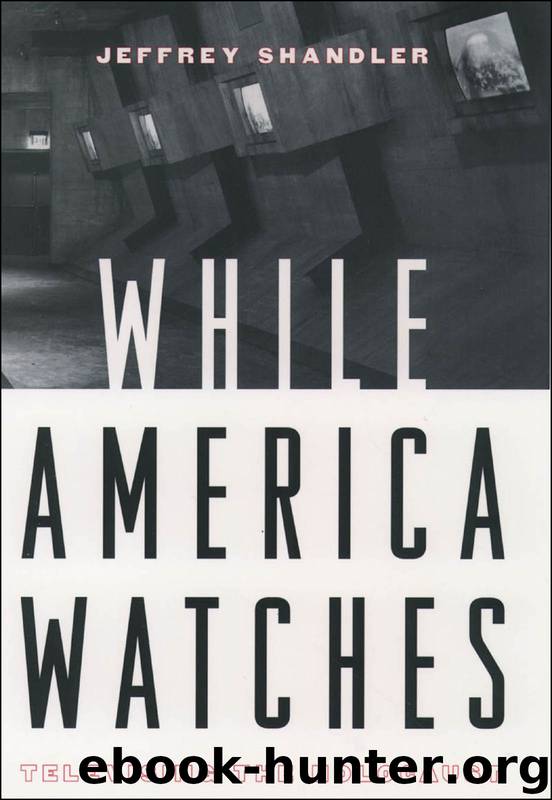While America Watches by Shandler Jeffrey;

Author:Shandler, Jeffrey;
Language: eng
Format: epub
Publisher: Oxford University Press, Incorporated
Published: 1999-05-14T16:00:00+00:00
Television as “Elder”
Erik Barnouw, who structured his landmark history of the American television broadcasting industry in terms of the human life cycle, labeled the period from the early 1960s to the late 1970s as its “elder” stage. This followed a “toddler” period (from the 1920s to the end of World War II) and “prime” years (from the early 1950s to the early 1960s), and it yielded to an era characterized by the advent of television’s “progeny”—video, cable, satellite, and so on—in the 1980s and beyond.10 Thus, American television and Holocaust survivors—and, by extension, Holocaust memory culture—can be thought of as age-mates. At the same time that Holocaust survivors began to grow old and their children were coming of age, American television showed signs of a generational shift of its own.
Barnouw characterized both the Roots (ABC, 1977) and Holocaust miniseries as being “in the spirit of reexamination and rededication” in the United States, which followed the war in Vietnam and the Watergate scandal and was fostered by the American bicentennial in 1976.11 At this time the American broadcasting industry also marked jubilees and commemorated its own achievements: NBC and CBS, the two oldest national networks, celebrated their fiftieth anniversaries in broadcasting in 1976 and 1977, respectively, and the Museum of Broadcasting opened in New York City in 1976.12 Broadcasters’ accomplishments were acknowledged outside the industry the same year with the establishment of an American Television and Radio Archives in the Library of Congress to preserve “the broadcasting heritage of the American people.”13 Members of the Jewish community undertook similar efforts in the United States and Israel, with the creation of major media archives devoted to Jewish subjects at the Hebrew University in Jerusalem (1970) and the Jewish Museum in New York (1979), as well as smaller collections established at schools and communal institutions.
At the same time, however, American public opinion surveys indicated unprecedented drops in television viewership and in the public’s esteem for the medium.14 In particular, many members of the “television generation”—that is, “the first generation in history to have grown up taking television for granted as an everyday, ubiquitous fact of life”—regarded the medium, in the words of two chroniclers of this generation, as “the idiot engine of the Establishment, electronic opiate of the consumerist masses, and thus a favorite object of ridicule and contempt.”15
As viewers became more familiar with television, they often grew more critical of what they were watching and more sensitive to the ideological underpinnings of programming in general. Viewer activism increased steadily during the 1960s and 1970s, some of it following the lead of Nicholas Johnson, commissioner of the FCC from 1966 to 1973 and author of How to Talk Back to Your Television Set. The number of books written for the general reader on the state of the medium increased considerably during these years. While some authors expressed cautious optimism about the potential of television (for example, Anne Rawley Saldich’s Electronic Democracy), others denounced it as a social evil (notably Jerry Mander’s Four Arguments for the Elimination of Television).
Download
This site does not store any files on its server. We only index and link to content provided by other sites. Please contact the content providers to delete copyright contents if any and email us, we'll remove relevant links or contents immediately.
| Direction & Production | Genres |
| Guides & Reviews | History & Criticism |
| Reference | Screenwriting |
| Shows |
Robin by Dave Itzkoff(2267)
Head of Drama by Sydney Newman(2207)
I'm Judging You by Luvvie Ajayi(2109)
The Paranormal 13 (13 free books featuring witches, vampires, werewolves, mermaids, psychics, Loki, time travel and more!) by unknow(2009)
Ten by Gretchen McNeil(1777)
Single State of Mind by Andi Dorfman(1719)
#MurderTrending by Gretchen McNeil(1575)
Key to the Sacred Pattern: The Untold Story of Rennes-le-Chateau by Henry Lincoln(1550)
Merv by Merv Griffin(1511)
Most Talkative by Andy Cohen(1506)
This Is Just My Face by Gabourey Sidibe(1387)
Notes from the Upside Down by Guy Adams(1375)
The Hunger Games: Official Illustrated Movie Companion by Egan Kate(1340)
Jamie Oliver by Stafford Hildred(1318)
Springfield Confidential by Mike Reiss(1309)
Clarkson--Look Who's Back by Gwen Russell(1259)
The TV Writer's Workbook: A Creative Approach To Television Scripts by Ellen Sandler(1256)
Binging with Babish by Andrew Rea(1232)
Blue Planet II by James Honeyborne & Mark Brownlow(1196)
